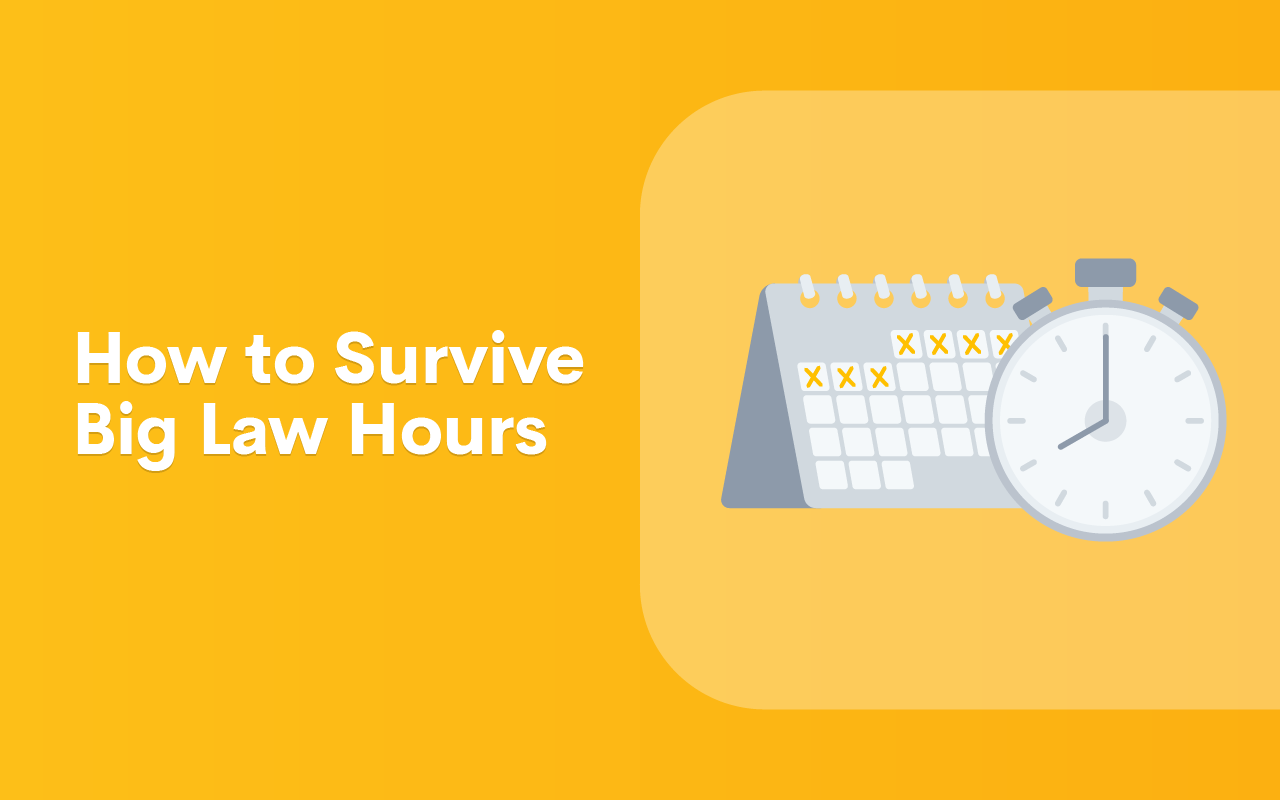How to Survive Big Law Hours

Getting a new position to work in big law is an exciting milestone. Yet as prepared as you may feel, chances are you've got a pit in your stomach knowing what to expect. It's no secret that you'll be working long and hard alongside some serious big dogs with impressive credentials.
Big law attorneys are known for working as much as 80 hours per week. This can be both physically and mentally grueling. Almost 50% of lawyers working that many hours claim it is so demanding that it has a negative impact on their life.
After only a few short months, many big law lawyers find themselves on the brink of burnout. The truth is that any position in the legal career is challenging. But the first few years of big law are an entirely different animal. But with the right tips, not only can one survive big law but thrive in it. To help you navigate the often overwhelming and unforgiving challenges of big law, here are some of the best tips for survival.
1Stop saying “big law” so much
First of all, repeating big law over and over is only going to psych you out. In order to separate your feelings from facts, you have to remove labels. There's a lot of pressure associated with “big law.” So take away that title, and you'll strip some of the added pressure.
The truth is that there are a lot of myths that go into working in big law. For one, many firms could care less about your law school prestige. While having a top law school on your resume will certainly not hurt, it doesn't mean it's the only way in. Ultimately, they care about how much work you’re willing to put in. So, show up with that in mind and see it as a job — not a “big law job.”
2 Make use of your free time
There's no way to put this lightly— you're not going to have a lot of free time on your hands during the first few years of working in big law. For that reason, it's incredibly important that you meticulously plan out how you plan on spending your free hours.
It is important to understand that burnout is a serious condition that can have a significant impact on your physical and mental health. Symptoms of burnout include fatigue, irritability, difficulty concentrating, and a loss of motivation. If left unchecked, burnout can lead to serious health problems such as depression and anxiety.
One of the key ways to prevent burnout is to make use of your free time to engage in activities that you enjoy and that help you to relax and unwind. Prioritize spending time with friends and family, and don’t forget that it's also important to practice self-care. For some people this might mean time at the gym, while for other people it may be reading, or playing Fornite— you do you. Whatever you do, make sure that you prioritize whatever it takes for you to recharge your battery.
Another important step in preventing burnout is to prioritize self-care. This might include things like getting enough sleep, eating a healthy diet, and practicing good hygiene. Many lawyers opt to hire a house cleaner for laundry services. When it comes to cooking, consider meal prep so that you have food ready to go on the fly. The more you can develop a system that prioritizes an efficient flow, the less you'll find yourself scrambling to get everything done when you finally have some time off.
It is also important to seek help if you are struggling with burnout, whether that means talking to a therapist or counselor or seeking support from friends and family.
3 Find a role model
Finding a role model while working in big law can be an incredibly valuable experience. Role models can serve as an inspiration and guide, helping you to navigate the often-complex world of big law and achieve your professional goals. They can also provide valuable mentorship and support, helping you to develop your skills and knowledge, as well as offering guidance on how to handle difficult situations.
A role model doesn't necessarily need to be a lawyer or a legal professional, either. Find someone worth emulating, and emulate the things you admire most. Read about them, soak up what their methods were to achieve what they did, and strive to do the same. Their story can serve as a guidebook for how to navigate the challenges you will face with big law hours.
Studying your role models successes and failures will help you apply them to your own political landscape of the area of law you practice. Reading their stories can provide valuable insight that push you to keep going even through adverse times in your career.
4 Show up on time
Punctuality is an essential part of professional conduct in any field, but it is especially important when working in big law. Unfortunately, many junior associates think they can show up late and leave early without putting in the time. While big law is certainly flexible, the fast-paced and high-pressure nature of big law demands that employees be punctual and reliable in order to meet deadlines and deliver results.
When you're punctual, you're showing that you value other people's time and that you're willing to take responsibility for your own commitments. This is particularly important in big law, where time is often of the essence and delays can have serious consequences. Being punctual also helps to establish trust and respect with colleagues and clients, which can be crucial in building and maintaining professional relationships. It can also be the key to a smooth workflow and it's essential for the success of the whole team.
Additionally, punctuality can also be a reflection of one's work ethics and professionalism, it helps to show that you take your job seriously and that you're dedicated to doing your best work. Being punctual can also help to demonstrate that you're dependable and trustworthy, which can be key to getting ahead in big law.
5 Remember your place
Knowing your place in a big law firm is crucial for your professional development and success. Understanding the hierarchy and culture of the firm, and being aware of the expectations and responsibilities of your role, can help you to navigate the often-complex world of big law and make the most of your time there.
Being aware of your place also means understanding the limits of your knowledge and expertise, and being willing to ask for help when needed. It is important to be humble, and to not overestimate your abilities. Junior associates should be open to learning from more experienced colleagues, and seeking guidance and mentorship from those who have the experience and skills they want to acquire. Additionally, it's also important to understand the importance of following the guidelines and procedures set by the firm, and to respect the decisions of the senior associates and partners, even if you disagree with them.
By knowing your place and understanding the hierarchy and culture of the firm, you can build trust and respect with your colleagues and clients, and also be able to make the most of your time in the firm. This can help you to develop your skills, knowledge and professional network, and also to position yourself for future opportunities and advancement.
6 Take breaks
Big law work can be demanding and intense, with long hours and tight deadlines. For that reason, it is important to take breaks in order to maintain your mental and physical well-being, and to ensure that you are able to perform at your best. Remember, you're not a machine, you're a human. And just like a car needs to refuel, you need to take a break to recharge and refocus.
It's also important to take breaks to prevent burnout, which can occur when one is working too much, and neglects their physical and emotional well-being. Without taking breaks, you'll start to feel like a robot, churning out legal briefs and contracts with no emotions or motivation. But with a quick break, you'll come back to your work with renewed energy and a fresh perspective. It's like hitting the reset button on your brain, clearing the clutter and allowing you to tackle your tasks with renewed vigor. So, take a break, grab a coffee, or go for a walk, and remember, you're not a robot, you're a lawyer, and it's important to take care of yourself.
It's also important to note that taking breaks doesn't mean only taking physical breaks like stepping away from your computer, it also includes taking mental breaks and disconnecting from work. This can include activities such as meditation, exercise, or reading, which can help to clear your mind and reduce stress levels.
7 Stay on top of your billing
Most lawyers don't realize just how much administrative work goes into their job until they finish law school. You might feel like you're constantly swimming against the tide, fighting deadlines and paperwork. But there's one thing that you can't afford to let slip through your fingers: your billing. You see, in big law, time is money and if you're not careful, you might find yourself drowning in a sea of missed billable hours.
Staying on top of your billing is like playing a game of Tetris, you need to be quick and efficient. It's important to log your hours as they happen, otherwise, you'll find yourself struggling to remember what you did three weeks ago-which can be a blur. So, stay on top of your billing, log your hours and keep that money coming in.
8 Keep a healthy work life balance
There's a lot of pressure that goes into working in big law, so that's why it's important that you practice self-care on your off time. Make sure that your personal life doesn't spill over into your professional one, and vice versa. During your downtime, don't think about your job whatsoever. Be present with your friends and family, and don't forget to show yourself a little love too. Whenever you get the chance, take naps, read a book, go for a walk— do whatever it takes to make the most of your downtime and prioritize rest.
Substance abuse is a serious problem in the legal world because of the high stress levels. Lawyers who don't take enough time to recharge their batteries often end up reaching for the bottle or worse, harder substances that can lead you on a downward spiral.
Survive big law hours the smart way
There are some lawyers that ultimately can't survive the grueling hours of big law. However, with a goal in mind you just might be one of the few that makes it. By following these tips, and using the right tools to streamline and automate, you'll win back hours of time that you can dedicate to more important tasks than in administrative work. By using software like Lawmatics all in one CRM, client intake, and timing and billing software, you'll be significantly more efficient.
Are you ready to see how Lawmatics can help you not only survive but thrive in big law? Sign up for a free product demo today!


